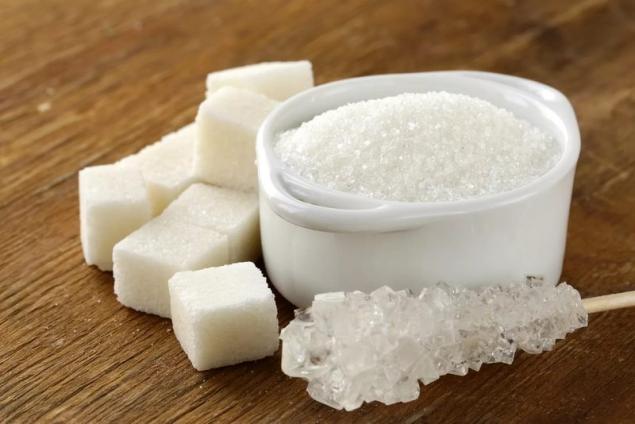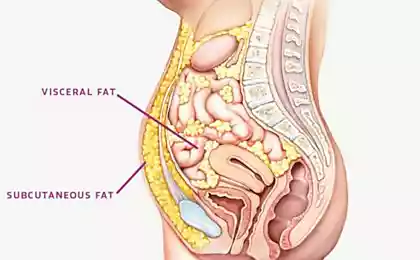409
Attention! Sugar is not food!
Scientists explain why sugar is not food
Of all the foods we eat, sugar has had the worst reputation lately. And if earlier it was believed that the only thing harmful to sugar is the content of a large number of calories, now scientists say about the complex biochemical effects of sugar on the body, leading to numerous negative consequences for health. Among the diseases that are associated with high sugar consumption are type 2 diabetes, many types of cancer, cardiovascular disease, hypertension, obesity, senile dementia, Alzheimer's disease and many others.
Cardiologist James Dinicolantonio and nutritionist Amy Berger explain how sugar both contributes to obesity and causes energy and nutrient deficiencies in the body. Their main postulate is that sugar does not meet the definition of food.

Energy/nutrient deficiencies in obesity
Humans learned to extract sugar from sugar cane and sugar beets centuries ago, and later to purify it into white crystals. In modern times, sugar can be refined and isolated to the point where it can be integrated into foods in amounts that are not found in nature and are unlikely to have ever been encountered during human evolution.
Pure refined sugar, high-fructose corn syrup (HFCS) and other high-calorie sweeteners in beverages and industrially processed foods create a glycemic load beyond our physiology’s ability to process sugars. This leads to negative metabolic consequences: hyperglycemia, hyperinsulinemia and oxidative stress.
Due to the high degree of purification, added sugar behaves like a narcotic substance.
Being edible, added sugar, however, cannot be considered “food”, and its consumption cannot be equated with eating foods containing natural sugars, but also serving as a source of fiber, vitamins, minerals and other phytonutrients that counteract the oxidative stress caused by small amounts of fructose. Whether a substance is a poison often depends on the size of the dose. The food industry has made it easy for consumers to overdose added sugars, a major public health concern in countries where consumption of processed, refined and sugar-laden foods is high.
Added sugar is not food
“Sugar is not a recommended product. Its current rationing should not be difficult, since sugar contributes nothing but calories, and the vitamins contained in other foods are absorbed by sugar in order to release these calories (Wilder – The Nutrition Guide, 1944).
Food is defined as “materials containing vital nutrients that are processed by the body to produce energy, stimulate growth and sustain life.”
Many types of added sugar do not meet this definition. While high-calorie sweeteners — honey, maple syrup, molasses, sorghum syrup — can contain extremely small amounts of micronutrients.The sweeteners most used by the food industry, sucrose and HFCS, are completely devoid of them. In fact, these added sugars not only do not contain any essential nutrients, but also have negative effects on all three important functions of food: energy production, growth stimulation, and life support. These two sweeteners are the focus of this article.
Added sugar does not produce energy or stimulate growth.
If you consider the first important function of food — energy production — then added sugar actually absorbs energy from the body, depleting its stores in tissues or absorbing nutrients from other types of food.
Added sugar replaces the more nutritious types of food from our diet while increasing our food needs. Vitamins such as thiamine, riboflavin and niacin are necessary for glucose oxidation. The metabolism of fructose, which makes up 50% of normal sugar, requires phosphates, which deprives cells of the vital substance ATP - adenosine triphosphate, which is one of the main transporters of energy in the body. In addition, fructose metabolism leads to oxidative stress, inflammation and damage to cellular mitochondria, also causing ATP depletion.
As a result, it turns out that the more added sugar we eat, the more energy the body depletes. This process can take particularly extreme forms in those people whose diet is already poor in key micronutrients.
Calories absorbed by food, including carbohydrates and refined sugar, are converted into energy in the form of ATP as a result of a complex biochemical process. The reactions involved in this process require various vitamins and minerals. When we eat pure refined sugar, there are no essential trace elements. This means that either the process of converting food into energy will be inefficient, or the body will spend the necessary reserves of trace elements to extract energy from sugar. All this can lead to an energy deficit, i.e. the body will spend more energy than it receives. But when we eat whole, natural foods, we usually get at least some of the nutrients we need to release the energy we eat.
The popularity of low-carb diets for weight loss, as well as their effectiveness in improving a large number of health indicators, led to the fact that many nutritionists and doctors began to demonize all carbohydrates. In fact, people with insulin resistance, type 2 diabetes, prediabetes, and metabolic syndrome (which affects more than 100 million people in the U.S. alone) do best at controlling blood sugar and insulin levels by limiting carbohydrate intake. But the damage to the energy functions of the body affects not just food containing carbohydrates.
The problem is high-carb food extracted from its “natural matrix” and purified of all other natural nutrients and fiber.
Especially strong metabolic damage to the body is caused by foods containing a high percentage of sugar and combining it with other refined carbohydrates: sugary drinks, cookies, bread, pastries, breakfast cereals and other products that combine flour and sugar, as well as products with sugar added to increase shelf life and improve taste.
Glycolysis - the process of converting glucose into energy, leading to an increase in ATP reserves - requires magnesium and many other micronutrients for its implementation: vitamin B, thiamine, riboflavin, niacin, pantothenic acid. Unlike refined sugars, many carbohydrate-rich whole foods — root vegetables, vegetables, whole grains — contain the minerals and vitamin B necessary for the body to use this food properly. Added sugar contains “fuel” in the form of carbohydrates, but lacks the accompanying elements necessary to convert this fuel into energy. Of course, each individual product cannot contain all the necessary micronutrients necessary for optimal metabolism. But a variety of natural diet should cover the basic needs of the body. However, when we eat too much added sugar, it begins to replace more valuable food and creates a shortage of vitamins and minerals necessary to digest not only glucose itself, but also natural food.
In addition, fructose consumption in amounts that have become the norm in industrialized countries also depletes ATP stores in blood vessel cells. To deplete ATP in the liver, only 50 grams of fructose is enough - this dose is contained, for example, in 700 ml of cola, i.e. in about two standard cans. This leads to stimulation of appetite and increased hunger signals – in response to this, you consume even more calories, which ultimately leads to weight gain and obesity.
The average American consumes 83.1 grams of fructose per day, and 20% of the population consumes more than 100 grams daily. This level of fructose consumption leads to chronic lack of energy, constant hunger and lack of strength for exercise. The logical consequence of high intake of added sugar is that you eat more and move less. This sugar-intercepted metabolic process can lead to obesity, especially when there is a tendency to it. But overeating and a sedentary lifestyle are just auxiliary causes of the growth of body fat. Consuming refined sugar in large amounts is the main reason driving the whole cascade of change. Many soft drink manufacturers use HFCS as a sweetener, containing up to 65% fructose, which is particularly worrying.
The paradox is that although added sugar contains energy, its high intake does not produce energy for the body. For a substance to be considered food, it must produce energy or help the body produce it, not just contain calories.
“Consumption of sugar and other relatively clean carbohydrates has become so high in recent years that it poses a major impediment to improving the population’s diet.” (Food and Dietetics Council, 1942)
This statement from 70 years ago is even more relevant today. Concern about the negative health effects of sugar is caused by its overconsumption around the world. The average consumption of sugar per capita in different countries of the world is in the range of 35-69 kg per year. This is 20 to 40 times more than a few centuries ago. This level of consumption gives 400-800 kcal per day from added sugar.
With a diet of 2,000 calories per day, this means that sugar replaces 40% of a high-nutrient diet, and not only gives us less nutrients, but also requires additional food to be metabolized. It is easy to understand why sugar consumption leads to nutritional deficiencies.
Consumption of sugary drinks is associated with reduced intake of calcium and other minerals, which can lead to malnutrition, especially in children. In addition, excess added sugar leads to insulin resistance, which reduces the body’s ability to use glucose as an energy source.
In addition, high levels of insulin reduce the body’s ability to use another key source of energy – fat. Cells lack energy because high insulin levels prevent energy from getting from fatty acids, resulting in a condition called “internal fasting” or “hidden cellular semi-starvation.” This can be called “famine in a land of abundance.”
But elevated insulin levels lead to increased energy needs, which further increases energy loss when added sugar is consumed. Due to the difficulty of accessing energy substrates, people with obesity, hyperinsulinemia and insulin resistance simultaneously suffer from overeating and lack of food. They carry thousands of calories of energy reserves in fatty tissues, but due to the consumption of added sugar, their hormonal state locks up these stores, and at the cellular level, these people starve.
Sugar also reduces appetite for more nutrient-dense foods, causing even greater nutrient deficiencies.. A possible reason for this is an increased level of insulin, which prevents energy from fats and increases cravings for carbohydrates. Animal studies have shown that rats fed sugar slowed growth and shortened lifespan.
Several other experiments on various animals have shown that adding sugar to otherwise adequate diets is a good way to do this. This leads to fatal malnutrition. And a number of studies have shown that when replacing starch in food with sugar, their life expectancy is reduced. This shows once again that the main problem is not just carbohydrates, but refined sugars purified from other nutrients. This contradicts the definition of food.
Finally, fructose and glucose favor the growth of bacteria and yeast, especially in those people who already have a high content of yeast in the body, and glucose contributes to the growth and spread of the fungus Candida ablicanas. A growing population of fungi competes with the body’s own cells for nutrients and draws energy and nutrients from various tissues.
Sugar also irritates the walls of the stomach and intestines, which can make it difficult to digest food, and fructose can contribute to diarrhea, leading to even greater loss of nutrients.

Added Sugar Does Not Support Life
Humans have survived without isolated refined sugar for nearly 2.6 million years. The notion that the body, and especially the brain, requires about 200 grams of glucose per day has contributed to the spread of dogma about the “vital necessity” of glucose.
Glucose is really essential for life, but that doesn’t mean it has to be part of our diet. Fatty acids can be processed by the body into ketonic bodies, which serve as fuel for the brain, which in the absence of glucose can give it up to 75% of the energy required.
The remaining energy is provided by glucose synthesized by the body in the process of glucogenesis from proteins, and glycerol obtained from its own fat tissues. Thus, exogenous glucose (i.e., obtained from outside, for example, from added sugar) is not necessary to maintain human life. For most people, limiting carbohydrate intake does not lead to any negative consequences. According to the Food Board of the Institute of Medicine of the National Academy of Sciences, “The minimum vital limit of carbohydrate intake is zero if adequate fat and protein intake is captured.”
Consumption of fructose and sucrose by people leads to abnormalities that cause metabolic syndrome (increased triglyceride levels, decreased levels of high-density lipoproteins, insulin resistance, high blood sugar, weight gain, especially in the abdomen). In addition, it causes conditions leading to cardiovascular diseases and early mortality: hyperinsulinemia, hypertension, atherosclerosis, obesity, type 2 diabetes, non-alcoholic fatty liver disease, increased adhesiveness (stickiness) of platelets, etc.
These conditions can be corrected and reversed with a low-sugar diet. The added sugar cannot be considered food.

Findings
Obesity is a state of energy and nutrient deficiency caused in part by excessive consumption of added sugars (especially sucrose and high fructose corn syrup). These sugars contain energy (calories), but at the current level of consumption, they inhibit energy production and trigger a number of disease-causing cardio-metabolic processes that reduce the quality of life and shorten its duration.
Added sugar is devoid of any micronutrients, it replaces more nutritious foods in our diet, absorbs nutrients from the body’s stores and causes a painful condition that disrupts digestion and homeostasis (i.e., maintaining a constant level of) energy.
The way forward Reducing the proportion of calories derived from added sugar to at least 5 to 10 percent could lead to significant improvements in public health. P.S. And remember, just changing our consumption – together we change the world!
Source: lchf.ru/14195
Of all the foods we eat, sugar has had the worst reputation lately. And if earlier it was believed that the only thing harmful to sugar is the content of a large number of calories, now scientists say about the complex biochemical effects of sugar on the body, leading to numerous negative consequences for health. Among the diseases that are associated with high sugar consumption are type 2 diabetes, many types of cancer, cardiovascular disease, hypertension, obesity, senile dementia, Alzheimer's disease and many others.
Cardiologist James Dinicolantonio and nutritionist Amy Berger explain how sugar both contributes to obesity and causes energy and nutrient deficiencies in the body. Their main postulate is that sugar does not meet the definition of food.

Energy/nutrient deficiencies in obesity
Humans learned to extract sugar from sugar cane and sugar beets centuries ago, and later to purify it into white crystals. In modern times, sugar can be refined and isolated to the point where it can be integrated into foods in amounts that are not found in nature and are unlikely to have ever been encountered during human evolution.
Pure refined sugar, high-fructose corn syrup (HFCS) and other high-calorie sweeteners in beverages and industrially processed foods create a glycemic load beyond our physiology’s ability to process sugars. This leads to negative metabolic consequences: hyperglycemia, hyperinsulinemia and oxidative stress.
Due to the high degree of purification, added sugar behaves like a narcotic substance.
Being edible, added sugar, however, cannot be considered “food”, and its consumption cannot be equated with eating foods containing natural sugars, but also serving as a source of fiber, vitamins, minerals and other phytonutrients that counteract the oxidative stress caused by small amounts of fructose. Whether a substance is a poison often depends on the size of the dose. The food industry has made it easy for consumers to overdose added sugars, a major public health concern in countries where consumption of processed, refined and sugar-laden foods is high.
Added sugar is not food
“Sugar is not a recommended product. Its current rationing should not be difficult, since sugar contributes nothing but calories, and the vitamins contained in other foods are absorbed by sugar in order to release these calories (Wilder – The Nutrition Guide, 1944).
Food is defined as “materials containing vital nutrients that are processed by the body to produce energy, stimulate growth and sustain life.”
Many types of added sugar do not meet this definition. While high-calorie sweeteners — honey, maple syrup, molasses, sorghum syrup — can contain extremely small amounts of micronutrients.The sweeteners most used by the food industry, sucrose and HFCS, are completely devoid of them. In fact, these added sugars not only do not contain any essential nutrients, but also have negative effects on all three important functions of food: energy production, growth stimulation, and life support. These two sweeteners are the focus of this article.
Added sugar does not produce energy or stimulate growth.
If you consider the first important function of food — energy production — then added sugar actually absorbs energy from the body, depleting its stores in tissues or absorbing nutrients from other types of food.
Added sugar replaces the more nutritious types of food from our diet while increasing our food needs. Vitamins such as thiamine, riboflavin and niacin are necessary for glucose oxidation. The metabolism of fructose, which makes up 50% of normal sugar, requires phosphates, which deprives cells of the vital substance ATP - adenosine triphosphate, which is one of the main transporters of energy in the body. In addition, fructose metabolism leads to oxidative stress, inflammation and damage to cellular mitochondria, also causing ATP depletion.
As a result, it turns out that the more added sugar we eat, the more energy the body depletes. This process can take particularly extreme forms in those people whose diet is already poor in key micronutrients.
Calories absorbed by food, including carbohydrates and refined sugar, are converted into energy in the form of ATP as a result of a complex biochemical process. The reactions involved in this process require various vitamins and minerals. When we eat pure refined sugar, there are no essential trace elements. This means that either the process of converting food into energy will be inefficient, or the body will spend the necessary reserves of trace elements to extract energy from sugar. All this can lead to an energy deficit, i.e. the body will spend more energy than it receives. But when we eat whole, natural foods, we usually get at least some of the nutrients we need to release the energy we eat.
The popularity of low-carb diets for weight loss, as well as their effectiveness in improving a large number of health indicators, led to the fact that many nutritionists and doctors began to demonize all carbohydrates. In fact, people with insulin resistance, type 2 diabetes, prediabetes, and metabolic syndrome (which affects more than 100 million people in the U.S. alone) do best at controlling blood sugar and insulin levels by limiting carbohydrate intake. But the damage to the energy functions of the body affects not just food containing carbohydrates.
The problem is high-carb food extracted from its “natural matrix” and purified of all other natural nutrients and fiber.
Especially strong metabolic damage to the body is caused by foods containing a high percentage of sugar and combining it with other refined carbohydrates: sugary drinks, cookies, bread, pastries, breakfast cereals and other products that combine flour and sugar, as well as products with sugar added to increase shelf life and improve taste.
Glycolysis - the process of converting glucose into energy, leading to an increase in ATP reserves - requires magnesium and many other micronutrients for its implementation: vitamin B, thiamine, riboflavin, niacin, pantothenic acid. Unlike refined sugars, many carbohydrate-rich whole foods — root vegetables, vegetables, whole grains — contain the minerals and vitamin B necessary for the body to use this food properly. Added sugar contains “fuel” in the form of carbohydrates, but lacks the accompanying elements necessary to convert this fuel into energy. Of course, each individual product cannot contain all the necessary micronutrients necessary for optimal metabolism. But a variety of natural diet should cover the basic needs of the body. However, when we eat too much added sugar, it begins to replace more valuable food and creates a shortage of vitamins and minerals necessary to digest not only glucose itself, but also natural food.
In addition, fructose consumption in amounts that have become the norm in industrialized countries also depletes ATP stores in blood vessel cells. To deplete ATP in the liver, only 50 grams of fructose is enough - this dose is contained, for example, in 700 ml of cola, i.e. in about two standard cans. This leads to stimulation of appetite and increased hunger signals – in response to this, you consume even more calories, which ultimately leads to weight gain and obesity.
The average American consumes 83.1 grams of fructose per day, and 20% of the population consumes more than 100 grams daily. This level of fructose consumption leads to chronic lack of energy, constant hunger and lack of strength for exercise. The logical consequence of high intake of added sugar is that you eat more and move less. This sugar-intercepted metabolic process can lead to obesity, especially when there is a tendency to it. But overeating and a sedentary lifestyle are just auxiliary causes of the growth of body fat. Consuming refined sugar in large amounts is the main reason driving the whole cascade of change. Many soft drink manufacturers use HFCS as a sweetener, containing up to 65% fructose, which is particularly worrying.
The paradox is that although added sugar contains energy, its high intake does not produce energy for the body. For a substance to be considered food, it must produce energy or help the body produce it, not just contain calories.
“Consumption of sugar and other relatively clean carbohydrates has become so high in recent years that it poses a major impediment to improving the population’s diet.” (Food and Dietetics Council, 1942)
This statement from 70 years ago is even more relevant today. Concern about the negative health effects of sugar is caused by its overconsumption around the world. The average consumption of sugar per capita in different countries of the world is in the range of 35-69 kg per year. This is 20 to 40 times more than a few centuries ago. This level of consumption gives 400-800 kcal per day from added sugar.
With a diet of 2,000 calories per day, this means that sugar replaces 40% of a high-nutrient diet, and not only gives us less nutrients, but also requires additional food to be metabolized. It is easy to understand why sugar consumption leads to nutritional deficiencies.
Consumption of sugary drinks is associated with reduced intake of calcium and other minerals, which can lead to malnutrition, especially in children. In addition, excess added sugar leads to insulin resistance, which reduces the body’s ability to use glucose as an energy source.
In addition, high levels of insulin reduce the body’s ability to use another key source of energy – fat. Cells lack energy because high insulin levels prevent energy from getting from fatty acids, resulting in a condition called “internal fasting” or “hidden cellular semi-starvation.” This can be called “famine in a land of abundance.”
But elevated insulin levels lead to increased energy needs, which further increases energy loss when added sugar is consumed. Due to the difficulty of accessing energy substrates, people with obesity, hyperinsulinemia and insulin resistance simultaneously suffer from overeating and lack of food. They carry thousands of calories of energy reserves in fatty tissues, but due to the consumption of added sugar, their hormonal state locks up these stores, and at the cellular level, these people starve.
Sugar also reduces appetite for more nutrient-dense foods, causing even greater nutrient deficiencies.. A possible reason for this is an increased level of insulin, which prevents energy from fats and increases cravings for carbohydrates. Animal studies have shown that rats fed sugar slowed growth and shortened lifespan.
Several other experiments on various animals have shown that adding sugar to otherwise adequate diets is a good way to do this. This leads to fatal malnutrition. And a number of studies have shown that when replacing starch in food with sugar, their life expectancy is reduced. This shows once again that the main problem is not just carbohydrates, but refined sugars purified from other nutrients. This contradicts the definition of food.
Finally, fructose and glucose favor the growth of bacteria and yeast, especially in those people who already have a high content of yeast in the body, and glucose contributes to the growth and spread of the fungus Candida ablicanas. A growing population of fungi competes with the body’s own cells for nutrients and draws energy and nutrients from various tissues.
Sugar also irritates the walls of the stomach and intestines, which can make it difficult to digest food, and fructose can contribute to diarrhea, leading to even greater loss of nutrients.

Added Sugar Does Not Support Life
Humans have survived without isolated refined sugar for nearly 2.6 million years. The notion that the body, and especially the brain, requires about 200 grams of glucose per day has contributed to the spread of dogma about the “vital necessity” of glucose.
Glucose is really essential for life, but that doesn’t mean it has to be part of our diet. Fatty acids can be processed by the body into ketonic bodies, which serve as fuel for the brain, which in the absence of glucose can give it up to 75% of the energy required.
The remaining energy is provided by glucose synthesized by the body in the process of glucogenesis from proteins, and glycerol obtained from its own fat tissues. Thus, exogenous glucose (i.e., obtained from outside, for example, from added sugar) is not necessary to maintain human life. For most people, limiting carbohydrate intake does not lead to any negative consequences. According to the Food Board of the Institute of Medicine of the National Academy of Sciences, “The minimum vital limit of carbohydrate intake is zero if adequate fat and protein intake is captured.”
Consumption of fructose and sucrose by people leads to abnormalities that cause metabolic syndrome (increased triglyceride levels, decreased levels of high-density lipoproteins, insulin resistance, high blood sugar, weight gain, especially in the abdomen). In addition, it causes conditions leading to cardiovascular diseases and early mortality: hyperinsulinemia, hypertension, atherosclerosis, obesity, type 2 diabetes, non-alcoholic fatty liver disease, increased adhesiveness (stickiness) of platelets, etc.
These conditions can be corrected and reversed with a low-sugar diet. The added sugar cannot be considered food.

Findings
Obesity is a state of energy and nutrient deficiency caused in part by excessive consumption of added sugars (especially sucrose and high fructose corn syrup). These sugars contain energy (calories), but at the current level of consumption, they inhibit energy production and trigger a number of disease-causing cardio-metabolic processes that reduce the quality of life and shorten its duration.
Added sugar is devoid of any micronutrients, it replaces more nutritious foods in our diet, absorbs nutrients from the body’s stores and causes a painful condition that disrupts digestion and homeostasis (i.e., maintaining a constant level of) energy.
The way forward Reducing the proportion of calories derived from added sugar to at least 5 to 10 percent could lead to significant improvements in public health. P.S. And remember, just changing our consumption – together we change the world!
Source: lchf.ru/14195























